presented by
 The obsession with weight in our society has lasted for decades. Pencil thin is in. No, body positivity is what matters. But all in all, when TikTokers, or even your neighbors, talk about weight, they bring it down to one thing: appearance.
The obsession with weight in our society has lasted for decades. Pencil thin is in. No, body positivity is what matters. But all in all, when TikTokers, or even your neighbors, talk about weight, they bring it down to one thing: appearance.
We spoke with experts from Inspira Health to dive into what really matters when it comes to weight – your health. Forget fads, forget social media expectations. Your overall health can be directly linked to your weight. And there’s a lot of factual, scientific information you should know to keep yourself healthy. We asked them to tell us.
Participants:
Charles McCann, MD Bariatric and General Surgeon Inspira Medical Center Mullica Hill
Christopher Bashian, DO Director of Metabolic and Bariatric Surgery Inspira Medical Center Mullica Hill
Nicole Zucconi, DO Family Medicine Physician Specializing in Obesity Medicine
Mavola Tench, MD Family Medicine Physician Specializing in Obesity Medicine
Bradee Rojas, MS, RD Registered Dietician Metabolic & Bariatric Surgery Program Coordinator Inspira Medical Center Mullica Hill
Tiffany Lilly, MSN, PCCN Certified Bariatric Nurse Metabolic & Bariatric Surgery Program Coordinator Inspira Medical Center Vineland
 Their patients
Their patients
Most of the time patients are saying I’ve tried everything, and I can’t lose weight. I tell them there is something that can be done. We just need to find out what works well for them.
Dr. Mavola Tench
There are a variety of reasons that people will come to seek care for weight loss. They may have a friend who is on medication, or they may realize on their own that they’ve been struggling with weight. Sometimes, we may have those sensitive conversations and say, “Hey, instead of giving you a blood pressure pill and a sugar pill and a cholesterol pill, how about we try to treat the underlying reason and focus on one thing that will, eventually, correct those other issues.”
Dr. Nicole Zucconi
When a person comes to come see a surgeon, it’s kind of their last step. They’ve tried diet and exercise multiple times and haven’t had success. They may have ongoing comorbidities that just can’t be managed unless they have improvement in their weight.
Dr. Charles McCann
They might have had an event – maybe they were going on vacation and they weren’t comfortable in the airplane seat and that triggers them to seek care for weight management. Or they’ve seen the result of a friend or a family member who took medication or had surgery, and they see their success. That’s all part of the decision to come in.
Bradee Rojas
The people we see have tried everything to lose weight, and it just hasn’t worked. They feel they’ve exhausted all options, and now they’re looking for a permanent solution with surgery. We also have patients who are referred by other physicians because the patient is taking medications for obesity-related conditions and their dosages just keep going up and up. We are in the business of taking medications away, so patients become healthier.
Dr. Christopher Bashian
 The problem of obesity
The problem of obesity
We refer to obesity as the silent killer – you don’t always see the toll it’s taking on the body, especially when you’re younger. Many people don’t realize it has a direct correlation with many other diseases. It’s essentially the root of diseases like diabetes, high blood pressure, high cholesterol, sleep apnea, acid reflux, joint pain, gout, PCOS, the list goes on and on. So by treating the root of it all, you treat many things.
Dr. Christopher Bashian
There are very few patients who are obese and don’t have any sort of comorbidities related to their weight. Most have head-to-toe issues related to their weight. Pretty much every single disease you can think of has some sort of link to obesity. Your life expectancy actually decreases the higher your BMI is. It’s an extremely serious problem.
Dr. Nicole Zucconi
60% of the population is either overweight or obese, and the epidemic just keeps going up and up. Those people are at risk for many different medical issues, like cancer, stroke, high blood pressure and diabetes. It’s definitely an issue. It’s affecting how we live.
Dr. Mavola Tench
Obesity as a disease
I don’t think many patients realize obesity is a disease. They don’t realize their sleep apnea is related to obesity. Their heart disease is related to obesity. Their high blood pressure is related to obesity. Maybe for us, it’s a no brainer, but I don’t think patients realize the link.
Dr. Nicole Zucconi
For a lot of patients, once obesity is described as a disease state, I think they feel a sense of relief – that it’s not all their personal choices, or their diet, or their exercise. Some patients feel like, “Oh, this can be treated. It’s not what I’m doing wrong.”
Bradee Rojas
When a patient has multiple obesity-related conditions, they get treated for those conditions. You have diabetes, you get some kind of diabetic medication. You have high blood pressure, you get blood pressure medication. Those patients don’t necessarily recognize they have those illnesses – despite it being managed – and that the cause of that illness, in general, is obesity. The fact that there are options to treat the global picture of obesity to help reduce those other conditions is really important. Not many patients who come into our offices understand that.
Dr. Charles McCann
 Obesity & willpower
Obesity & willpower
For most of their life, many patients have heard they should eat less, eat better, exercise more, but living with obesity is way more than that. It depends on a patient’s genetics, metabolism, appetite, food cravings. It’s not just calories in, calories out. We want to educate the patient to know there are many aspects of obesity, and there are treatments out there.
Tiffany Lilly
It’s not due to a lack of willpower. Even if you’re dieting and exercising, you still sometimes need the medications to help hit the reset button. It’s just how complex the disease is.
Dr. Nicole Zucconi
Sometimes patients think if they do one thing and it doesn’t work, that’s it, they’re done. No, we constantly reassess and work with them on how they can change things. This is more of a journey and not a destination.
Dr. Mavola Tench
A lot of patients have had success with weight loss, but it lasts for a short period of time, because you do something for two, three, four weeks, and then you fall back into your old lifestyle habits. Even if you take medication and start to lose weight, eventually you’re going to fall off one of those curves and start gaining some weight back, unless you are very regimented. Part of treatment is support from our nutritionists, dieticians and the patient’s primary care doctor who can address these issues routinely. That is support that will help you keep your weight down throughout the rest of your life.
Dr. Charles McCann
Medications
It’s FDA approved to treat a patient with medication if their body mass index is 30 or over, or 25 to 29 with comorbidities. If the patient’s insurance covers weight loss medication – some don’t at all – we can get it covered with those definitions. I also want them to be motivated to make lifestyle changes.
Dr. Mavola Tench
There are two big categories of medications: stimulant based and non-stimulant based. Every single one of these medications has certain patient factors and medical history components that we take into account to ensure we are properly prescribing – we’re not going to give a stimulant to someone who has known heart disease or anxiety. And then there is the injectable class, which Zebound is the strongest. When we experienced the drug shortage and people couldn’t get Zebound – I’ve never received so many phone calls from patients.
Dr. Nicole Zucconi
Medications can be successful, but you have to use them for the right person. It shouldn’t be a blanket treatment. We’re running into a lot of issues with these medications. Insurance stops paying for them or the companies run low on supply. Patients also have to increase the dosage periodically, because the body develops tolerances to the current dose. When you increase the dose, you also increase the potential for side effects. Patients may have nausea, vomiting and abdominal pain. A lot of patients can’t tolerate those symptoms, so they end up stopping the medications. Then they’re back to square one.
Dr. Christopher Bashian
When a patient starts weight loss medication, they consult with a dietician to learn how to eat healthy, and about portion control and serving size. When these medications cause them to only eat one or two small meals a day, we want to be sure they’re picking high protein choices and not reaching for a bag of chips. They should also see an exercise specialist, so they lose fat and not muscle. We want to give patients the tools to lose weight in a healthy way.
Tiffany Lilly
At Inspira, there are lots of educational components explaining that this is not one-and-done. It’s not a shot and you go home, and you’re done. You don’t have your surgery and that’s the only thing you’ll ever need. This is a long-term disease that we treat in a long-term fashion.
Dr. Charles McCann
 Bariatric Surgery
Bariatric Surgery
The most common surgeries you’ll hear about are the gastric sleeve and the gastric bypass. For the gastric sleeve, we are basically taking the stomach down from about the size of a football, when it’s fully expanded, to about the size of a banana. You get full a lot faster, so you get less calories in at each meal. With the gastric bypass, you’re taking the stomach down from the size of a football to the size of a lemon, so your stomach becomes a restricted type of pouch. You absorb only about 70% of the nutrients that you would normally eat. Both are very successful with weight loss long-term.
Dr. Charles McCann
Bariatric surgery is performed robotically. The robot has consistently shown to provide patients with quicker recovery, less pain, less need for narcotic pain medications – which we have completely eliminated from our practice – less time in the hospital and minimal side effects. It has completely changed the landscape when it comes to doing weight loss operations.
Dr. Christopher Bashian
Education for patients
If we want to see true success, which we define as weight loss that’s long-lasting, you need an all-encompassing approach with a dedicated team: your doctor, dieticians, program coordinator, mental health specialists, consulting physicians. At Inspira Health, we don’t see weight loss in the short term and then forget about it. We follow patients for life because we believe support and education are what people truly need.
Dr. Christopher Bashian
We see the patient at multiple touch points. They typically see the surgeon first, and then we start the education. We host information sessions that review the different types of surgeries and commonly asked questions. We host support groups where we have different speakers, different topics, all about life before and after surgery. We provide continued education throughout their journey.
Tiffany Lilly
I always tell patients after surgery that they’re stuck with me now, because we have a lot of support for them afterwards. I’d say about 20% of my day is fielding questions. We all can do better nutritionally, and there are a lot of components to that: reading food labels, debunking what’s on TikTok, learning what is healthy. We provide a lot of that education.
Bradee Rojas
 Life after bariatric surgery
Life after bariatric surgery
There’s a big misconception with these operations that after surgery, you’re going to have abdominal pain, you can’t keep anything down, you’re going to be starving all the time. When performed correctly, those issues are not present, and they shouldn’t be. This field of surgery has come a very long way. What bariatric surgery used to be is certainly not what it is today.
Dr. Christopher Bashian
At Inspira, we have a program called the GetWell Loop, and it’s an application that every patient is enrolled in. It’s free, and the loop stays with them for a full year after surgery. This is a direct line for check ins – it’s a direct messaging system. Patients also get education checklists, like how to prepare your house for surgery. Honestly, we want to follow the patient for life, and we have a lot of ways they can contact us in real time.
Bradee Rojas
Once our patients receive a surgery date, they are automatically enrolled in GetWell Loop, and they get information and reminders. They also answer questions for us. If the question before surgery is, “Are you on a blood thinner” and they check yes, then it will alert the care team, and we can make sure the surgeon is aware that the patient is taking blood thinners. It gives the patient direct communication with their care team, and they really, really like that.
Tiffany Lilly
Eating after bariatric surgery
After surgery, there are different diet stages to help patients heal and also to help them get the protein and the nutrients they need. It’s typically a clear liquid diet for a couple days to a week, depending on the surgeon, and then it’s a full liquid diet, then it’s usually a blended diet, and then it’s either a soft or a regular diet.
Tiffany Lilly
There’s a big psychological component to how we eat and what we eat. Inspira has many support groups with therapists and psychologists to talk about how food really affects our relationships with other people. Around the holidays, patients might not want their loved ones to be offended because they’re not eating the food they typically eat. Or if they’ve always coped with food, they may think we’re taking a coping mechanism away. I believe the only foods that are bad for you are the ones you’re allergic to or if they’re moldy. Other than that, there is a way all foods can fit your diet.
Bradee Rojas
The whole point of a long-term diet is to find something that works for you, but then just eat it in smaller quantities. If you want to go out with your friends and have Mexican food, have nachos, whatever, that’s fine, but only eat a third of the plate instead of the whole plate of nachos. You’re re-negotiating your relationship with food, understanding where your new limits are, and then trying to stick to that as best as you can.
Dr. Charles McCann
 A patient they’ll always remember
A patient they’ll always remember
I had a patient who wanted to be able to enjoy going on a roller coaster with his son. It took him two years to go from his initial visit to surgery. But he actually called me from Disney World one day while he was in line for a roller coaster. He was able to fit comfortably in the seat, and he was having the time of his life with his son. That was pretty cool.
Bradee Rojas
I had a patient who started at a little over 320 pounds, and now one year after surgery, she’s 185. She took every tool we gave her, and she used it to her advantage. She absorbed all the information, all the education, and made it her priority. She’s off her diabetes medications, and she no longer has any blood pressure issues. She can play with her 3 kids. It’s gratifying to be able to see that level of success. We’re so proud of her, and she’s so proud of herself which is the best part.
Dr. Christopher Bashian
I had a young gentleman. He was in his late 20s/early 30s, and his BMI was way over 50. So in my mind, I’m thinking this is a difficult BMI to get passed, and maybe he will end up having surgery. But he was very, very motivated. Over the next year, he proceeded to lose 50 pounds just by addressing his behavior, addressing his nutrition, addressing his exercise, and not taking a whole lot of medication. I was surprised. I thought he would need a lot more. So, you know, things we think may not make a big difference, they really do.
Dr. Mavola Tench
We had a mom who had weight loss surgery with us, and then her three daughters also had weight loss surgery. Genetics predisposed the whole family to obesity, so we were able to help an entire family live a healthier life.
Tiffany Lilly
If you are concerned about your weight…
You’re not alone. There are experts out there who are here and willing to help. Make an appointment with a weight loss specialist or a bariatric surgeon. We are very comfortable having the important conversations, and we can make you comfortable too.
Dr. Charles McCann
What can you add to your life that’s going to be healthier? A cup of water? A walk at the end of the day or a vegetable to your breakfast? When we want to lose weight, we always think of things we have to take away, but let’s think about what we can add.
Bradee Rojas
Do what you can do. Make small changes. If you can decrease the sugar in sweetened drinks to start, if you can take the small steps, it’s going to make a big difference.
Dr. Mavola Tench
I want people to understand that obesity is a disease, and obesity medications and bariatric surgeries are safe and effective solutions for long-term weight loss.
Tiffany Lilly
Don’t beat yourself up. This isn’t your fault. Obesity is a complex and complicated chronic disease, and we’re all here to help you become healthier.
Dr. Nicole Zucconi
The only way you’re truly going to know if bariatric surgery is a good option for you is if you come in and get all the information from us. If you are not ready for it, you shouldn’t do it. But get all your questions answered before you make that decision.
Dr. Christopher Bashian


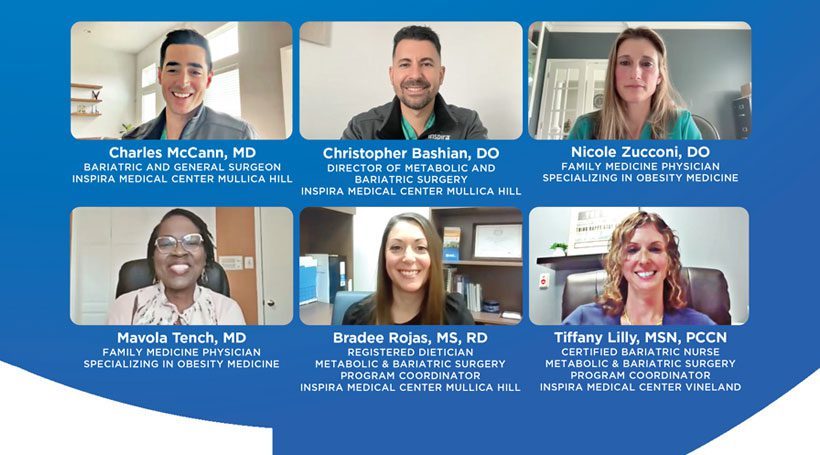
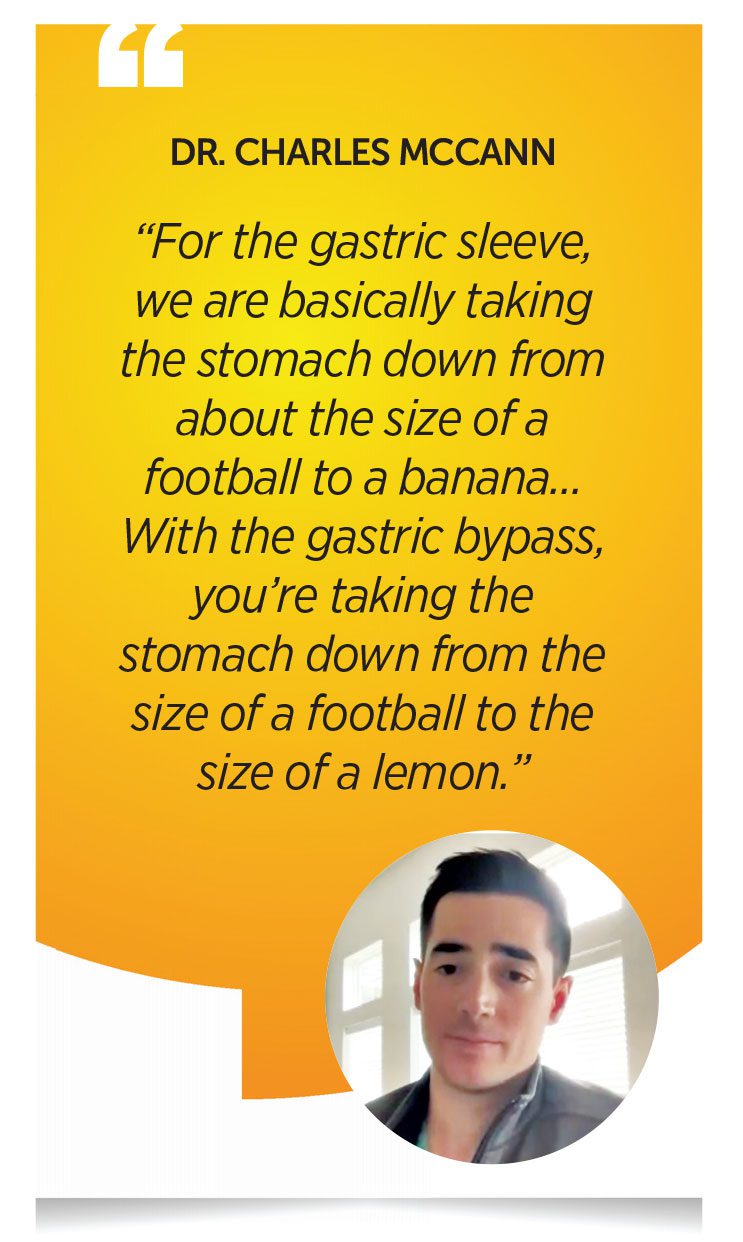 Their patients
Their patients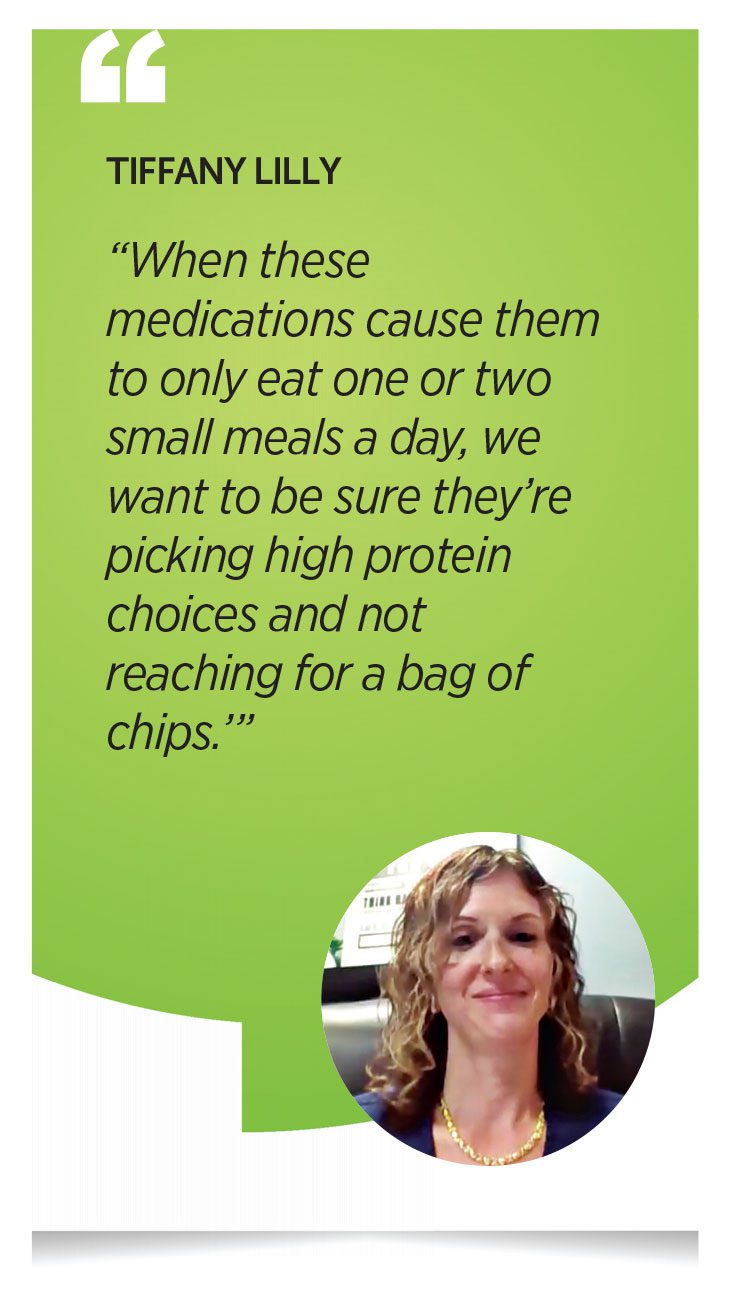 The problem of obesity
The problem of obesity Obesity & willpower
Obesity & willpower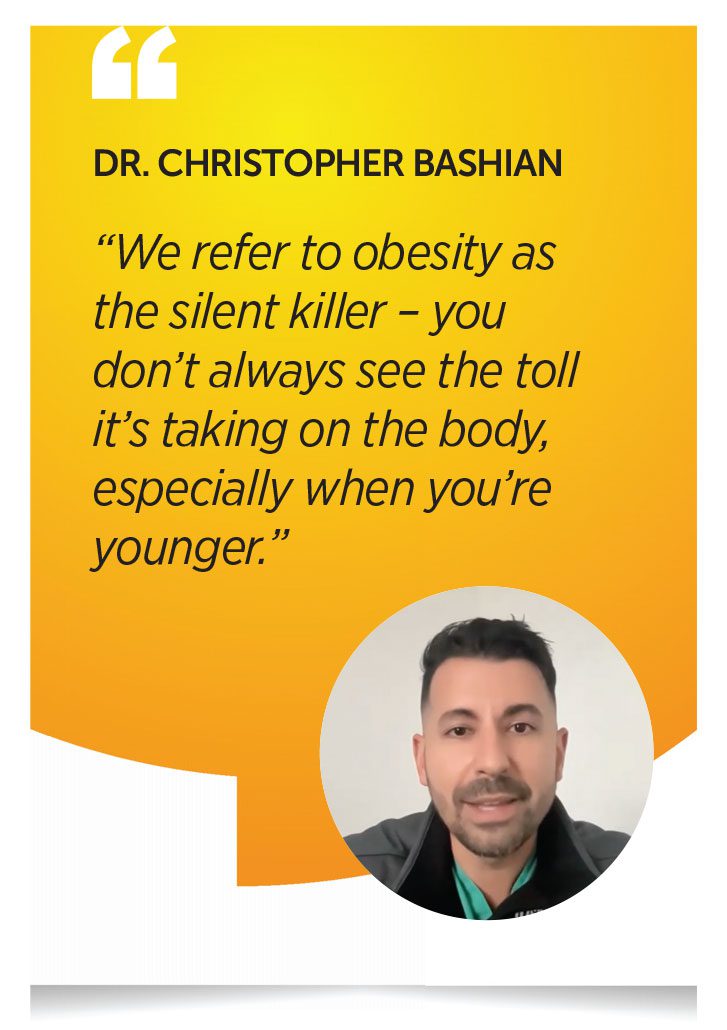 Bariatric Surgery
Bariatric Surgery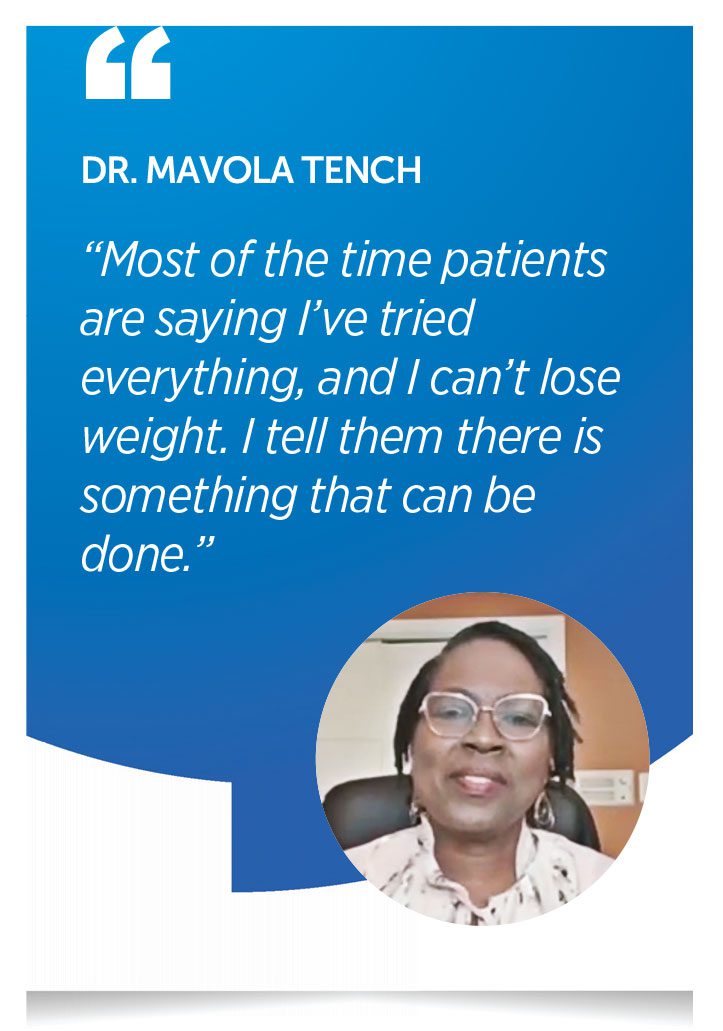 Life after bariatric surgery
Life after bariatric surgery A patient they’ll
A patient they’ll










